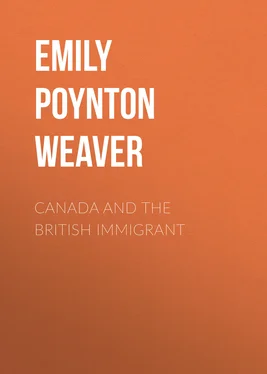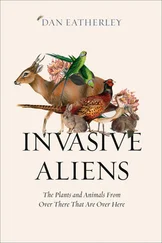Emily Poynton Weaver - Canada and the British immigrant
Здесь есть возможность читать онлайн «Emily Poynton Weaver - Canada and the British immigrant» — ознакомительный отрывок электронной книги совершенно бесплатно, а после прочтения отрывка купить полную версию. В некоторых случаях можно слушать аудио, скачать через торрент в формате fb2 и присутствует краткое содержание. Жанр: Путешествия и география, История, foreign_edu, foreign_antique, foreign_prose, на английском языке. Описание произведения, (предисловие) а так же отзывы посетителей доступны на портале библиотеки ЛибКат.
- Название:Canada and the British immigrant
- Автор:
- Жанр:
- Год:неизвестен
- ISBN:нет данных
- Рейтинг книги:3 / 5. Голосов: 1
-
Избранное:Добавить в избранное
- Отзывы:
-
Ваша оценка:
- 60
- 1
- 2
- 3
- 4
- 5
Canada and the British immigrant: краткое содержание, описание и аннотация
Предлагаем к чтению аннотацию, описание, краткое содержание или предисловие (зависит от того, что написал сам автор книги «Canada and the British immigrant»). Если вы не нашли необходимую информацию о книге — напишите в комментариях, мы постараемся отыскать её.
Canada and the British immigrant — читать онлайн ознакомительный отрывок
Ниже представлен текст книги, разбитый по страницам. Система сохранения места последней прочитанной страницы, позволяет с удобством читать онлайн бесплатно книгу «Canada and the British immigrant», без необходимости каждый раз заново искать на чём Вы остановились. Поставьте закладку, и сможете в любой момент перейти на страницу, на которой закончили чтение.
Интервал:
Закладка:
Chapters might be written on the means by which the Loyalists came to Canada. Often their journeys from their old homes took weeks. Many came by sea from New York to the Maritime Provinces, and a piteous sight they presented, on their arrival, in worn and often positively ragged clothing. Others came in canoes or heavier wooden boats, making long roundabout voyages up one stream and down another to Lake Ontario, but in places having to carry both boats and goods across a long “portage.” Yet others, of the more fortunate class, who had saved something from the wreck of their fortunes, travelled in big covered wagons, which served for tents at night for the women and children; and some brought in a cow or two as well as the horses or oxen that drew their vehicles.
Many of the Loyalists had lost all, and depended for their new start in life entirely on the bounty of the government. Others had some means of subsistence left, not a few having served as officers during the Revolutionary War and drawing half-pay. They were of all classes, from ex-officials of the revolted colonies, clergymen, doctors, lawyers, and merchants to private soldiers, labourers, Indians and even negro slaves.
Many of them were men and women of good education, and one of the most difficult problems to be faced in the new settlements was the education of the children. Soon many tiny log school-houses were put up, and the demand for teachers was so great that anyone who had a smattering of knowledge had a good chance to be put in charge of a little school. Often, however, it fell to the mother to give her boys and girls their first lessons in reading and writing by the hot light of the great fires that roared up the chimneys on a winter’s evening.
Books in the settlements were few, but generally well read, newspapers were non-existent, and there are traditions in more than one settlement of an obliging postmaster, who used to carry the whole “mail” of a district about with him in his hat, so that he might distribute the letters as occasion offered.
Amongst these pioneers laboured missionaries of different denominations, whose experience of toilsome journeys and perils by land and water resembled those of the Apostles. In canoes, on foot or on horseback they tried courageously to serve the needs of parishes that are now counties; and great was the rejoicing when at last some little log-church was built, though it might have no seats but rough boards set on short pieces of tree trunks.
In these years of hardship the courageous spirit and the useful experience of the Loyalists triumphed, and well and truly did they lay the foundation of a new British nation in the north. Some Americans of adventurous turn of mind, but not of their political creed, early found their way into the land; but when in June, 1812, there broke out between the young American Republic and England a war, which had grown out of the struggle of the last-named nation with Napoleon, it was the old spirit of the Loyalists which dominated Canada; and in a long three years’ conflict they again and again beat back the invaders across their frontiers. They were indeed well aided by the French of Lower Canada, and by newcomers from the British Isles; but, whoever might falter, the Loyalists were determined that their new country should remain British.
This, of course, tended to draw other immigrants loyal to the Empire to Canada. Of these later immigrants something will be said in dealing with the separate provinces; but Canada as a whole has never lost her heritage of loyalty, nor of the independence of spirit which has come to her from the descendants of the men who forced the Great Charter from the reluctant tyrant John, and of those who extorted the assent of King Charles to the Bill of Rights.
As the years went on, it was found difficult in practice to evolve a system by which the new British-American colonies should have the full liberty they demanded without weakening the tie binding them to the Mother-land. When Upper and Lower Canada were separated, Lieutenant-Governor Simcoe congratulated the former province on possessing a “transcript of the British constitution,” but the measure of self-government given was much less than that which the men of the British Isles had attained; and there was difficulty and blundering and heart burning, there was even an actual rebellion in the Canadas before a really satisfactory system of colonial government was worked out.
It is interesting that, to a large extent, the political institutions of Canada, like those of the Mother-land, are not what might be described as an invention of any statesman, or group of statesmen, but rather resemble a living organism, which, in order to survive and grow, has had to adapt itself to its environment. At first, after the rude shock of the secession from the Empire of the Thirteen Colonies, British statesmen were nervously apprehensive that the growth of the new colonies in wealth and power would inevitably result in their separation from Britain. Then there arose a school of statesmen, who were prepared to acquiesce with eagerness in any step on the part of the “overseas dominions” in the direction of independence. But after more than a century of dangers and vicissitudes the Canadian provinces are British still; and the politicians in England who wish to bid them farewell are no longer numerous.
That they are British (to return to the point whence we started) is due above all to the sturdy spirit of the brave old Loyalists who formed the earliest large accession of British immigrants to Canada. They had their faults; they were not free from the bitterness and cruelty with which they charged their victorious opponents. They were martyrs of a lost cause, and as a class were never remarkably patient sufferers; but they were undoubtedly fine material for the building of a new nation, and the debt that Canada owes to them is not to be lightly estimated.
When it appeared (as it soon did appear) that the form of representative government granted to the colonies was only a shadow of the popular government of the Mother-land, the liberty-loving colonists began a persistent and long-continued agitation for a change. The flaws in the colonial form of government were that at first the representatives of the people had no control over the finances of the several provinces; and that the government was administered by the officials of what was called the “Executive Council,” who were appointed, and could only be removed, by the royal governor representing the Crown, and were not in any way responsible to the electors of the colonial Assemblies. The executive councillors were in a position to bid defiance to the popular branch, especially as the Legislative Council, or Upper House, of the colonial legislatures, composed of men appointed by the governor, usually made common cause with them against the Assemblies. In fact, in the Canadas many men had seats in both councils; and in Nova Scotia and New Brunswick one council had both legislative and executive functions.
After a short period, even the governors sent out from England were at a great disadvantage compared with the councillors, many of whom had spent the greater part of their lives in the colony. A newly-arrived governor naturally looked to his councillors for advice and information. It was they and their families who formed the most important part of his little court, and if he did not speedily fall under their influence, he had many difficulties thrown in his way. In Lower Canada the political troubles were aggravated by the fact that almost all the members of the legislature and Executive Councils belonged to the small English-speaking Protestant minority.
For nearly half a century the disputes between the different branches of the government continued; but at last, after the rebellion of 1837-38, Lord Durham was sent as High Commissioner to Canada, and though his conduct of affairs was severely criticized at home, he managed to probe to the bottom the chronic state of discontent in the colonies; and the remedy he recommended was that the executive in the colonies should be made, as in England, responsible to the people, and that the body of officials in the several provinces should only continue to rule while they could command the support of a majority in the Assemblies. His advice was followed, and within a few years all the provinces had “Responsible Government.”
Читать дальшеИнтервал:
Закладка:
Похожие книги на «Canada and the British immigrant»
Представляем Вашему вниманию похожие книги на «Canada and the British immigrant» списком для выбора. Мы отобрали схожую по названию и смыслу литературу в надежде предоставить читателям больше вариантов отыскать новые, интересные, ещё непрочитанные произведения.
Обсуждение, отзывы о книге «Canada and the British immigrant» и просто собственные мнения читателей. Оставьте ваши комментарии, напишите, что Вы думаете о произведении, его смысле или главных героях. Укажите что конкретно понравилось, а что нет, и почему Вы так считаете.


![О Генри - Граф и свадебный гость [Черное платье] [The Count and the Wedding Guest]](/books/405331/o-genri-graf-i-svadebnyj-gost-chernoe-plate-th-thumb.webp)









